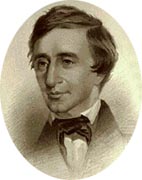
Henry David Thoreau
|
Government Regulation
There is no odor so bad as that which arises from goodness tainted. ...
If I knew for a certainty that a man was coming to my house with the conscious design of doing me good,
I should run for my life.
Thoreau, Walden
Regulations are laws intended to control actions by individuals.
They are an initiation of force by the government against the populace.
By making certain actions illegal, the government attempts to control the economy through indirect means.
Since attempting to force people to work is politically dangerous and the results are poor, regulation is used
to try to divert the economy.
This is the primary means of attempting to control a mixed economy.
It tries to harness the productive potential in a free market, while trying to twist it to the purpose of government.
Even regulations that require actions work this way.
It adds cost to a particular effort, and forces it to be done in particular ways, but always in the hopes of
harnessing the market.
Regulation is particularly destructive because its consequences are unfelt.
Since the regulation disallows certain actions, it is impossible to tell what damage the regulations cause.
An example of a regulatory agency is the Food and Drug Administration (FDA).
By disallowing certain medications from going on the market, it is impossible to say what the effects are.
We do see that when the FDA delays a drug from entering the market, when it enters it may save many lives.
We don't see the lives lost while the FDA delay the drug, though.
And we don't see the lives lost because of drugs the FDA never allowed into the market.
Since the effects of regulation are not seen, it is difficult for people to see the damage.
When an income takes a few thousand dollars from you, you see it.
The regulations destroy wealth before it gets to you.
You never see how much is destroyed, and it is impossible to calculate.
The lack of visibility makes regulations particular dangerous.
|


